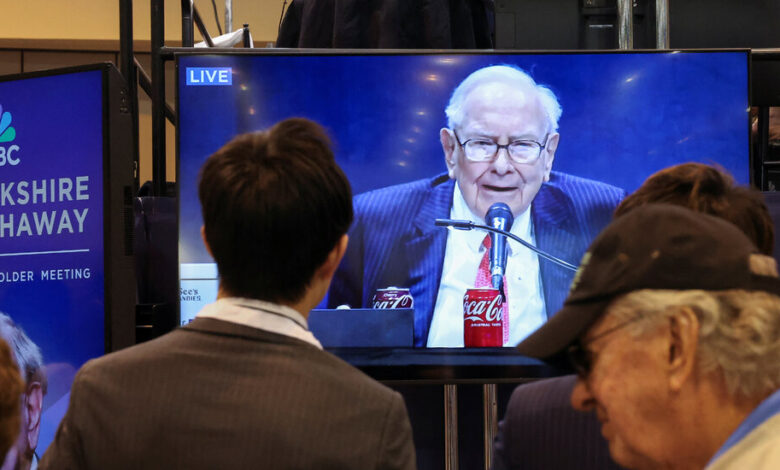How Warren Buffett Changed the Way Investors Thought of Investing

Warren E. Buffett’s strategy for investing is surprisingly straightforward.
“Forget about purchasing good businesses at great prices; instead, focus on buying great businesses at fair prices,” he once advised shareholders of Berkshire Hathaway, his conglomerate.
This approach, known as value investing, predates Mr. Buffett’s career but no one has executed it as successfully or as consistently as he has. Through the years he has influenced a whole generation of financiers, including hedge fund titans on Wall Street, and advocated for the common practice of long-term investing.
During his six-decade tenure at Berkshire Hathaway, Mr. Buffett utilized value investing to transform a struggling textile company into a $1.1 trillion conglomerate, a corporate acquisition powerhouse, and a microcosm of the U.S. economy. From owning one of America’s largest railroads to being the top shareholder in companies like American Express and Coca-Cola, Berkshire’s portfolio speaks volumes about Mr. Buffett’s investment acumen.
With a personal fortune estimated at around $168 billion, Mr. Buffett has become an iconic figure synonymous with American-style capitalism. His expertise was sought after by corporate leaders and government officials alike during the 2008 financial crisis.
Mr. Buffett’s unparalleled success has garnered him millions of followers worldwide. Thousands of them gathered at Berkshire’s annual meeting in Omaha when he announced his intention to step down as CEO.
The news was met with astonishment followed by thunderous applause from shareholders who owe their wealth to owning Berkshire stock and hang on to every word of Mr. Buffett’s financial wisdom.
“Everything I know about investing, I learned from Warren Buffett,” remarked billionaire hedge fund manager Bill Ackman, who was present at the meeting.
Mr. Buffett acknowledges that luck played a significant role in his vast fortune. He often refers to winning “the ovarian lottery” by being born in the U.S. during a time of economic prosperity.
His investment philosophy was shaped by Benjamin Graham, a pioneer of value investing and Mr. Buffett’s professor at Columbia University. With guidance from Charles T. Munger, his longtime business partner, Mr. Buffett transformed Berkshire into a prime example of disciplined investing.
Mr. Buffett’s dedication to his craft was unmatched, spending hours poring over corporate financials for both research and enjoyment.
He leveraged his knowledge in various ways, acquiring successful businesses like See’s Candy, Fruit of the Loom, and NetJets. However, the most impactful acquisitions were in the insurance sector, with companies like National Indemnity and Geico providing a significant cash reserve.
This cash, known as the “float,” became the cornerstone of Mr. Buffett’s deal-making prowess. Using this capital and profits from other ventures, Berkshire acquired a total of 189 companies, including major players like BNSF railroad and Berkshire Hathaway Energy.
As of March 31, Berkshire’s cash reserves, dubbed the “elephant gun” by Mr. Buffett, stood at nearly $348 billion.
Those who have negotiated with Mr. Buffett describe him as amiable but unwavering when it comes to financial matters. He is known to walk away from deals if the numbers don’t align with his principles.
“Warren is the most disciplined investor and the clearest thinker I’ve ever known,” remarked Byron Trott of BDT & MSD, a merchant bank that Mr. Buffett trusted. “His ability to simplify complexity, lead with humility, and maintain conviction is unparalleled.”
Berkshire’s investment portfolio includes holdings in companies like American Express, Bank of America, and Coca-Cola, with Apple being one of its most profitable investments. Berkshire’s endorsement is seen as a mark of quality for these companies.
With a massive balance sheet and Mr. Buffett’s expertise, Berkshire has capitalized on opportunities by purchasing assets when others are forced to sell.
“Warren Buffett has been an exceptional investor in American Express and a personal friend,” stated Stephen Squeri, CEO of American Express, following Mr. Buffett’s announcement.
A key factor in Mr. Buffett’s success is his long-term investment strategy. He famously stated, “Our favorite holding period is forever,” allowing investments to compound over time, akin to a snowball gaining momentum downhill.
Unlike mutual funds or hedge funds, Berkshire does not charge fees, a practice that Mr. Buffett criticizes within the financial industry. Despite his success, Mr. Buffett acknowledges making mistakes, such as missing out on early investments in tech giants like Amazon and Microsoft.
However, his track record remains remarkable, with Berkshire gaining 5,502,284 percent from 1964 through 2024 compared to the S&P 500’s 39,054 percent during the same period. His annual average return of 19.9 percent surpasses the S&P’s 10.4 percent.
Mr. Buffett’s approach has inspired numerous financiers, with many attempting to emulate his methods. His influence extends beyond the business realm, with fans making pilgrimages to his Omaha residence and sharing his affinity for products associated with Berkshire.
Mr. Buffett’s fame transcends business circles, making cameo appearances on TV shows and using his platform to critique Wall Street’s shortcomings. He took a firm stand against excesses in the financial sector, exemplified by his intervention in the Salomon Brothers trading scandal in 1991.
His influence extends to Washington, where policymakers heed his opinions on economic matters. Mr. Buffett’s endorsement carries weight, prompting actions like treating executive stock options as corporate expenses.
Despite his Democratic leanings and support for higher taxes on the wealthy, Mr. Buffett advised presidents from both political parties. His pivotal role in stabilizing the financial system during the 2008 crisis earned him praise from industry leaders and politicians.
While Berkshire’s future seems secure under new leadership, some investors fear it may lose its distinctive edge without Mr. Buffett at the helm. The company’s next CEO, Gregory Abel, is highly regarded, but the absence of Mr. Buffett’s stock-picking genius may impact Berkshire’s legacy.
According to Lawrence Cunningham, director of the Weinberg Center for Corporate Governance, Mr. Buffett has set Berkshire up for success in the next chapter. However, some investors worry that the company may lose its uniqueness and strategic focus without Mr. Buffett’s hands-on involvement.
The end of Mr. Buffett’s era marks a significant transition for Berkshire Hathaway, with some shareholders lamenting the potential loss of its visionary leader.





